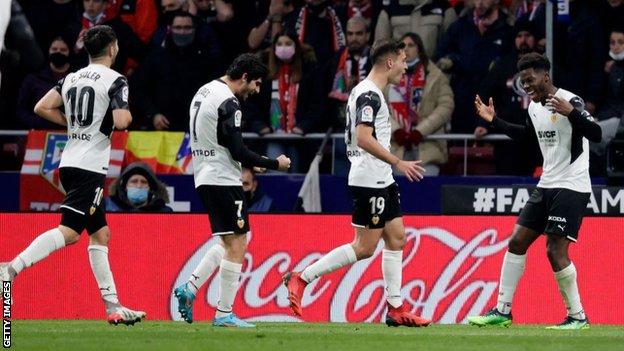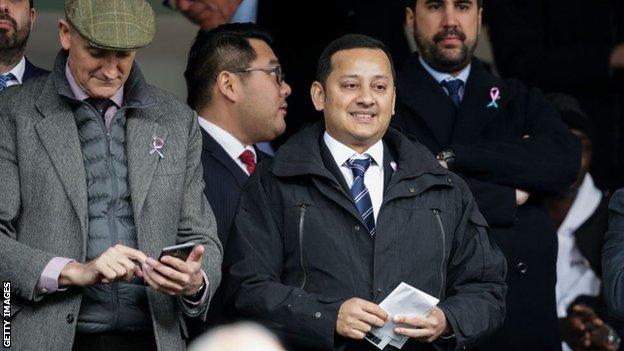How teenager Yunus Musah became the blueprint for Valencia's future
Yunus Musah has already had to make a number of bold decisions that have shaped his young career.
Leaving Arsenal to join Valencia at the age of 16 was one, opting to represent the USA after playing his youth football with England another, and those choices appear to have paid dividends with the teenage midfielder becoming an integral part of both set-ups.
At Valencia, they see the 19-year-old as a perfect example of what the La Liga club are trying to achieve when recruiting young players for their esteemed academy.
Musah played with the likes of Bukayo Saka, Emile Smith Rowe and Folarin Balogun during his seven years in north London - while aspiring to one day be a Mesut Ozil or Olivier Giroud on his trips to the Emirates - but was convinced by Valencia that his future lay in Spain.
"It wasn't hard to come into a new culture," says Musah, who was born in New York City to Ghanaian parents and lived in Italy until the age of nine, when he moved to London.
"The thing that really attracted me was the history behind the club, knowing so many players from the academy have been given an opportunity to flourish in the first team. It made me want to pursue my dreams here.
"Living in Spain has been great. I have met a lot of people and have learned the language - it is another experience I have added to my life and the best part is I am doing it while doing what I love, which is playing football."
Musah is set to play his 20th La Liga game of the season when Valencia host Barcelona on Sunday and his 60th in all competitions since breaking into the first team aged 17 last term.
"At this age, playing for the first team and having the trust from the club to play week in, week out is amazing," adds Musah, who has also now won 13 caps for the USA.
The first reaction is very painful'
Valencia have a reputation for developing world-class players but in recent years that has become more of a necessity for a club battling financial constraints, with the Covid-19 pandemic wiping out half their revenue.
They responded to the loss of 100m euros - around £80m - by selling five key players in the summer of 2020, including Ferran Torres to Manchester City and Rodrigo Moreno to Leeds.
"The first reaction is very painful," says Valencia president Anil Murthy. "You need to reduce your team costs, you do this by letting go of players who are earning more; that reduces the quality of your team as well.
"You must take a medium-term perspective as well because we want this club to be fixed and you cannot stop growing, and you keep growing off the pitch - off the pitch is a smaller investment than paying or buying footballers."
The off-field projects he refers to include completing Valencia's Nou Mestalla stadium, where construction began 15 years ago, and developing their academy.
The Singaporean says Valencia are "not out of the hole" financially and will continue to invest in young prospects "that bring you a higher value in future", adding they "don't hesitate to sell" when the time is right for the club.
But Murthy says rebuilding the playing squad is a "much easier fix" and this season Valencia have held on to their most important assets, despite bids for Portugal winger Goncalo Guedes, while adding promising youngsters on loan in RB Leipzig's Ilaix Moriba and Tottenham winger Bryan Gil.
'Is he recovering? Tracking back? Talking to coaches?'
More than 100 graduates have made their debut with Valencia since the academy's inauguration in 1992 but the club are constantly looking at ways to improve.
They have reduced the number of players in each age group to focus on "quality rather than quantity" and spent money on improving scouting to bring in more international players, with youngsters from Japan, Senegal and Norway now on their books.
"We decided to put the player at the centre of the project and surround them with all the elements that are important," explains academy general director Sean Bai.
"Day by day we create a culture of learning and self-upgrading."
There is also an identity department, which sets out to transmit the club's "DNA" throughout every age group and provide a pipeline of talent for the first team.
"Our end goal for the academy is to one day see a player putting on the jersey and you can associate him with being a Valencia player from the style of play and values he is transmitting," says Bai.
A big focus goes on personality and what players do off the pitch, with academy prospects expected to pass school exams in order to train and play.
"We spend time to talk to people around them, friends and team-mates, our contacts who might know them, the family," says Bai. "What is their style and what are they like in the dressing room? Are they players who can assimilate into Valencia and function in a team?"
He says as well as looking at the "highlights of any players, young players as well", a big focus goes on whether they are "performing at the level throughout the rest of the game" and in training, showing they "deserve of a place in Valencia academy".



